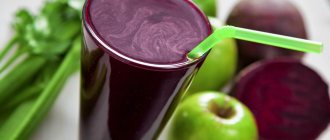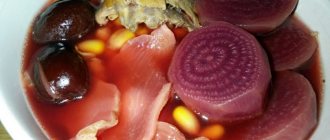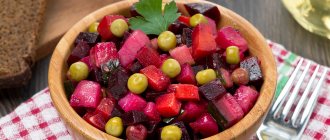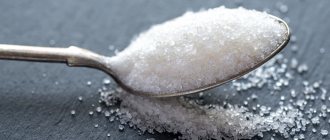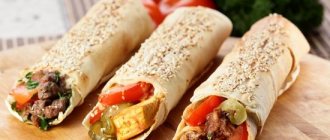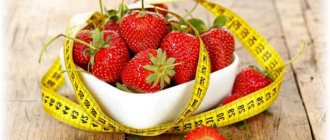Composition and nutritional value in beets
The vegetable contains the following vitamins: A, B1, B2, B3, B5, B6, B9, C, E.
In addition, it is rich in the following minerals:
Vitamins and minerals in beets.
- potassium;
- magnesium;
- calcium;
- phosphorus;
- sodium;
- boron;
- manganese;
- zinc;
- iron;
- sulfur;
- vanadium;
- copper;
- cobalt;
- chromium.
Nutritional value: 100 g of product contains 1.7 g of protein, 0.1 g of fat and 10 g of carbohydrates.
Rules for eating beets
Beets are a versatile food that can be prepared in a variety of ways.
For any cooking method, the following rules must be observed:
- For boiling, steaming or baking, it's best to choose root vegetables that are roughly the same size so they cook at the same time.
- The peel comes off much easier after cooking.
- You can pre-peele the root vegetables before baking, but do not do this before cooking. The peel helps preserve the color of the beets and vegetables cooked without them will look faded.
- Roasting is the best way to prepare root vegetables. Many of the nutrients in beets (such as nitrates and vitamin C) are water soluble. During cooking, they leak from the vegetable into the broth and do not enter the food.
- Beets are quite dense and hard, so their preparation can take a relatively long time. The time required for this depends on its size, but for an average root vegetable with a diameter of 5-8 cm it takes about 45-60 minutes. for baking in the oven and about 30 minutes. - for boiling in water.
- To check the degree of readiness of the beets, you need to pierce them with a fork or knife. The vegetable is ready when the tip of the kitchen utensil easily enters it 2-4 cm deep without any resistance.
The following products go well with beets:
- Herbs: tarragon, thyme, basil, dill, cilantro and parsley.
- Seasonings: cumin and curry.
- Sauces and oils: vinegar, olive oil, mustard, horseradish, capers and chili.
- Dairy products: sour cream, yogurt, goat cheese and blue cheese.
- Fruits: orange, lime, lemon and apple.
- Vegetables: onions, spinach and potatoes.
How to eat beets
To make raw beets tastier, it is recommended to pour lemon juice over them and season with coarse black pepper or cayenne pepper. It can also be mixed with leafy greens and vegetables (carrots, peppers, tomatoes). Pickled and fermented beets are delicious in salads, meat appetizers, and bruschetta.
The cooked root vegetable is usually added to various dishes and snacks:
- Salads. The beets can be placed in them hot or cold. In both forms, it pairs best with salty and sweet ingredients. Spicy soft cheese (goat, feta or blue cheese), as well as berries, apples and oranges, go especially well with it. It's a good idea to add walnuts or pumpkin seeds, which are great for adding a crunchy texture to the salad and complementing the flavor of the beets.
- Smoothie. A great way to add more nutrient-dense vegetables to your diet. One of the benefits of using beets in smoothies is that they can be mixed with ingredients that can mask their taste and smell. Berries are one of the most recommended combinations.
- Sauces. Beets mix well with soft ingredients such as hummus, yogurt or sour cream. The result is a bright purple, blue or pink sauce that can double as a table decoration.
- Vegetable mixtures. Most often, beets are served with other root vegetables such as carrots, potatoes, onions and turnips because they all cook in the same amount of time in the oven. But you can think outside the box and add it to any mixed vegetables. One thing to remember is that beets tend to color other ingredients, so it is advisable to add them at the very end of cooking to prevent the entire dish from turning purple.
How many vitamins and minerals are in 100 grams of beets?
100 g of root vegetables contain vitamins (in mg):
- A - 0.002;
- B1 - 0.02;
- B2 - 0.04;
- B3 - 0.4;
- B5 - 0.1;
- B6 - 0.07;
- B9 - 0.013;
- C - 10;
- E - 0.1.
Amount of minerals:
- manganese - 66 mg;
- potassium - 288;
- sodium - 46;
- phosphorus - 43;
- calcium - 37;
- magnesium - 22;
- sulfur - 7;
- iron - 1.4;
- zinc - 0.4;
- boron - 0.28;
- copper - 0.14;
- vanadium - 70 mcg;
- cobalt - 2 mcg;
- chromium - 20 mcg.
Beetroot Recipes
- Juice of fresh beet roots is drunk 0.5-1 glass 3-4 times a day after meals for 4 days for hypertension.
- Fresh juice, mixed in half with honey, is taken as a sedative and for anemia, 0.5 cups 3-4 times a day or long-term - 1 cup for 3-4 weeks.
- The juice of fresh grated root vegetables is used to treat lung diseases (inflammation, pleurisy), hypertension (mixed in half with bee honey).
- Drink 1 tablespoon of fresh beet juice in equal proportions with radish and carrot juice 3 times a day for iron deficiency anemia.
- Drink 0.5 cups of fresh beet juice 3-4 times a day for cancer.
- Drink 0.5 cups of juice on an empty stomach as a laxative.
- When treating tonsillitis and tonsillitis, rub a glass of beets, add 1 tablespoon of vinegar, infuse, then squeeze out the juice and vinegar and rinse your mouth; It was recommended to swallow part of the resulting juice (1-2 tablespoons).
- For leg ulcers, it is used in the form of a paste, applied to the affected areas, replacing it with another portion when it dries.
Essential Nutrients and Calories
The root vegetable is considered a dietary product; 100 g contains only 42 kcal.
Beetroot contains the following nutrients:
Calorie content of 100 g of beets.
- proteins;
- carbohydrates;
- fats;
- water;
- organic acids;
- ash;
- starch;
- mono- and disaccharide substances;
- alimentary fiber.
The benefits and harms of beets
So, in the previous sections we looked at the amazing properties of beets. Of course, the benefits of this vegetable are enormous, but beets can also cause harm. Let's look at some restrictions on its use.
Of course, for a healthy person, beets do not have any contraindications.
However, negative consequences when consuming large quantities of this vegetable (over 1 kg) can be diarrhea and intestinal disorders (gas formation and discomfort).
At the same time, the main contraindications of beets are determined by the following diseases:
- Allergic reactions
- Urolithiasis disease
- Low pressure
In all of the above cases, caution should be exercised in consuming beets. It's better to consult a doctor.
Benefits of vegetables
Beets have a beneficial effect on the human body both raw and cooked. Juice is made from it, and soups are made from the tops. The root vegetable helps remove heavy metal salts from the body and prevents the development of cancer cells thanks to its betaine content.
This antioxidant normalizes liver function, regulates metabolism, prevents the occurrence of atherosclerosis, helps with Alzheimer's disease, osteoporosis, and has a positive effect on cardiac activity.
Including raw beets in the diet allows you to strengthen vascular and capillary walls, improve the functioning of the digestive system, replenish iron and iodine deficiency in the body, and lower blood pressure.
For women, the vegetable is useful during menstruation: B vitamins, iron and cobalt prevent anemia. It helps men increase muscle and sexual activity, and children cope with allergic reactions. It contains many antioxidants, vitamins B and U, the latter promotes better stomach function.
The root vegetable contains gamma-aminobutyric acid, which improves metabolic processes in the brain. Pectins and fiber effectively remove decay products from the body and prevent the growth of pathogenic microbes in the intestines.
The benefits of beets for the human body.
Dietary fiber from beets increases peristalsis, which is why the plant is recommended to be included in the menu for constipation. With the help of organic acids, food begins to be more actively digested.
Boiled
Boiled beets are more useful raw, especially if a person wants to lose weight. Betaine helps start fat oxidation processes, restore liver function, and improve the absorption of protein foods. Curcumin, contained in the root vegetable, interferes with blood supply to adipose tissue, helping to stabilize body weight.
Boiled vegetable has a laxative and diuretic effect. It has an analgesic and anti-inflammatory effect, fights depression well and relieves hangovers.
Beets are necessary for hematopoiesis, because... it includes microelements responsible for this process. Regular consumption of the root vegetable helps avoid the development of anemia. It also benefits pregnant women. Folic acid included in the composition is required for the proper formation of the fetal nervous system.
The culture is characterized by its iodine content, which is beneficial for iodine deficiency pathologies of the thyroid gland, and zinc, which increases visual acuity. By including root vegetables in the diet, the muscles' need for oxygen is reduced and endurance increases during active sports.
In beet juice
It is often used during a weight loss diet. Freshly squeezed juice promotes better heart function. By taking the drink every day, you can strengthen your immune system.
Beetroot juice thins the blood well, helps with blocked veins, thrombosis and liver diseases. To do this, it needs to be left for 2-3 hours. Zinc has a beneficial effect on the walls and mucous membranes of the rectum and stomach.
It is useful to drink beetroot drink for neoplasms. The juice contains substances that prevent cancer cells from developing and reduce the negative effects of chemotherapy on the body.
To achieve a positive effect, it is recommended to drink half a glass on an empty stomach. For skin cancer, dressings should be made using freshly squeezed beet pulp and juice.
The drink is beneficial for hypertension - it should be consumed three times a day after meals. Has a beneficial effect on the liver. If you drink it regularly, the bile ducts begin to cleanse and the functioning of the organ is normalized.
In addition, beet juice:
Beneficial properties of beet juice.
- increases the number of red blood cells;
- improves memory;
- dissolves excess calcium, thereby strengthening blood vessels;
- supports the functioning of the lymphatic system.
The drink helps women by eliminating discomfort due to blood loss during menstruation. Benefits pregnant women, relieving insomnia, stress and emotional instability.
It is also recommended for men to take it: it prevents the growth of adenoma and prevents the development of cancer. Zinc and B vitamins enhance the production of male sex hormones.
In beet leaves
Tops are extremely useful for the human body, because... she:
- helps with problems with blood vessels and heart;
- stimulates metabolism;
- benefits for pancreatitis and diabetes.
If you eat dishes made from beet leaves every day, you can alleviate the condition of gastrointestinal diseases, such as ulcers or gastritis. Fiber allows you to cleanse the intestines well and protect beneficial microflora from pathogenic ones.
Tops can be added to main courses, salads, and soups. After its use, hematopoiesis improves and the development of atherosclerosis is prevented.
The leaves contain a lot of phosphorus and iodine, so greens are beneficial for endocrine diseases and liver pathologies.
Contains a large amount of magnesium and calcium, which have a beneficial effect on the heart and affect the condition of cartilage tissue, teeth and bones. It is recommended that older people consume dishes with tops to prevent the development of osteoporosis and normalize the circulatory system.
Vitamins K, PP and U in the leaves, when taken regularly, lower blood sugar. Flavonoids protect the heart muscle, anthocyanins reduce inflammation and increase intestinal barrier function.
Ascorbic acid saturates the body with energy, B vitamins normalize the functioning of the central nervous system.
Composition and benefits of beet juice
The calorie content of one hundred milliliters of juice does not exceed 40 Kcal. Its unique composition helps to improve the human condition in many diseases. Many put it in their nose and also rinse their throat, claiming that it quickly relieves burning, soreness, and runny nose, that is, the main signs of a cold or infectious disease. To prepare beet juice, a few young, fresh root vegetables are enough.
It is recommended to start using it with a few tablespoons per day. This is due to the body’s unknown reaction to the introduction of a new drinking product into the diet. It is permissible to drink up to three glasses of drink per day, after cooling it in the refrigerator. It is recommended to give beetroot juice to children no earlier than they reach the age of three in order to avoid the occurrence of allergic reactions.
To make large quantities of the drink, you must use an electric juicer. It has been noticed that in combination with the juice of celery, carrots, and apples, the beneficial properties of beetroot increase significantly. The main vitamin substances in it are elements belonging to groups B2, C, E, PP. The mineral composition of the drink is represented by components such as potassium, magnesium, sodium, phosphorus, iron and calcium.
Contraindications for the use of beets
Eating root vegetables is prohibited for some chronic diseases. These include:
- stones in the kidneys;
- renal failure;
- hypotension;
- diseases of the gastrointestinal tract, bladder and kidneys;
- diarrhea;
- osteoporosis;
- osteochondrosis;
- diabetes;
- allergy to this vegetable.
Beetroot juice has a positive effect on kidney function, but the oxalic acid contained in beets can cause crystallization of the fluid in the organ. This aggravates the course of kidney stones and other pathologies of the bladder and kidneys.
Contraindications for consumption
However, despite the vitamins in beets that are present in large quantities, not everyone is allowed to consume them. The main contraindications to eating beet products are:
- decreased blood pressure;
- increased stomach acidity;
- urolithiasis, especially oxaluria;
- osteoporosis;
- diabetes;
- chronic diarrhea.
You should not start treating diseases of various origins on your own using traditional methods, using beetroot juice, decoctions and cooked products. Many recipes offered online are useless and will do more harm than good. For this reason, it is extremely important to consult with a specialist nutritionist about treatment using root vegetables.
In what form do beets retain more vitamins?
Raw root vegetables contain many minerals and biologically valuable substances. When cooked, the amount of ascorbic acid in it decreases slightly, but all trace elements remain unchanged.
As a result of exposure to high temperatures, the content of fruit acids in the vegetable, which cause intestinal irritation, decreases, and almost all of the nitrates, which can be allergens or carcinogens, are transferred to the decoction.
Thus, the vegetable is best consumed boiled. The amount of vitamins in it is almost identical to the raw product, but there are much fewer contraindications for taking it.
Benefits of beets for the body
Each of the vitamins contained in beets brings invaluable benefits to the body. Moreover, it is recommended to eat not only root vegetables, but also fresh tops.
The benefits of beets for the body are as follows:
- Normalizes the functioning of the nervous system.
- Vitamin B5 improves the condition of the skin and mucous membranes.
- The functioning of the immune system is stabilized, which is facilitated by vitamin C. As a result of its deficiency, the gums become loose and begin to bleed, and nosebleeds often occur due to the fragility of the blood capillaries. With regular consumption of root vegetables, these problems can be avoided. Now it’s clear what vitamin in beets helps you get sick less.
- The functioning of the endocrine system and thyroid gland is normalized due to the high iodine content (slightly less than in seaweed).
- Improves intestinal function due to its high dietary fiber content.
- Stabilizes the functioning of the circulatory system, increases the elasticity of blood vessels.
- Helps increase hemoglobin levels in the blood.
- It is a diuretic and helps cleanse the liver and kidneys of toxins.
- The antioxidants in beets help fight cancer cells.
- The biologically active substance betaine is involved in the regulation of fat metabolism and promotes weight loss. It also increases the physical endurance of the body.
Beets are equally beneficial for men, women and children. This vegetable must be present in every person’s diet every day.
Rules of use
In the absence of restrictions and contraindications, root vegetables should be present in the diet regularly. When boiled, it is added to soups, warm and cold snacks are prepared from it, and preserved for the winter. In its raw form, it is eaten in salads and used for juices.
How much root vegetables should you eat to increase hemoglobin? Eating beets in different forms about 3-6 times a week will not harm a healthy person, but will only help raise hemoglobin and improve the overall composition of the blood.
For medicinal purposes, it is best to use freshly squeezed juice, observing the following rules .
- Due to the strong effect of the raw product, it is better to start using it with small doses, gradually increasing the volume of liquid you drink by 25-50 ml.
- In the absence of an allergic reaction, the volume can be increased to half a liter of juice per day, dividing it into two parts.
- It is best to mix beet juice with others: cucumber, carrot, celery, etc. First, take a smaller part of the beet juice, gradually the ratio of juices can be adjusted to 1:1.
- Juices should be freshly squeezed, and not prepared for several days: this way, not only the taste and freshness of the product will be preserved, but also many of its healing properties.
If at the beginning of the cleansing and therapeutic course the dosage of drinking juice is exceeded, deviations in health may be observed: dizziness, nausea, etc. This is due to the fact that the body is deeply cleansed of accumulated toxins.
How to select and store beets
Beets can be found in the produce section of most large stores. They're widely available throughout the year, but the peak season runs from June to October, which is the best season to scour farmers' markets and health food stores for fresh, organic beets. Beet juice and beet powder can also be found in health food stores and online stores.
When purchasing beets, look for small to medium-sized roots that have uniform, smooth skin and deep color (purple, red, pink striped or gold are the most commonly available). Stay away from fresh beets that have spots or severe bruising where beet juice is “bleeding” from the root.
Beet greens are actually completely edible and are rich in nutrients such as the carotenoids beta-carotene and lutein/zeaxanthin. It can be used in recipes as a substitute for chard.
Although we most often see purple beets in grocery stores, they actually come in a variety of colors, most of which have very similar flavors, health benefits, and uses.
Beets are a great addition to smoothies or salads. It can also be used in sandwiches, paninis and pasta dishes. Because of its natural sweetness, it works well in some dessert recipes.
How to eat beets?
Raw beets and their benefits
Of course, to reap all the beneficial properties of beets, you need to eat them raw.
But for this you need to get used to it. If there are no serious problems with the stomach and intestines, then raw beets will be the best choice for your health.
Here are some interesting recipes for healthy raw beet salads:
Simple but healthy salad
- Grated beets
- Chopped walnuts
- Greens (dill, parsley, cilantro, arugula)
- Season with vegetable oil.
- For piquancy, you can add lemon juice and zest.
- A little salt (optional)
- Avocado slices (optional)
Beetroot against cancer
Red beets have a detrimental effect on cancer cells. Cancer of the stomach, lungs, rectum, and bladder can be treated with grated raw beets and their juice.
According to research, cancer cells are affected by anthocyanins, coloring compounds from the group of plant phenols. Anthocyanins from blueberries, black currants, black elderberries and St. John's wort also stop the development of cancer cells. However, according to experimental data, red beets are 8 times more effective against cancer cells.
How to preserve vitamins in beets?
What substances beets contain depend on how they are consumed. During cooking, some of the beneficial compounds are lost. Not every person has the desire to eat fresh root vegetables. To maximize the benefits, you should cook the vegetable properly.
After thorough washing, the beets are placed in a pan of water, where they are cooked for about 45 minutes. It is very important not to damage its skin. The cooking time depends on the size of the root vegetable. Larger vegetables may require more cooking time.
It is not recommended to cook vegetables cut into pieces. Otherwise, vitamins and minerals will go into the water. The usefulness of cooked root vegetables will be minimal. The baked product contains much more healthy substances.
When baking, the vegetable is covered with aluminum foil. Juice is effective for the treatment and prevention of diseases. It is involved in improving metabolic processes, strengthens the body and improves intestinal function. Known benefits for diseases of the kidneys, stomach and upper respiratory tract.
Beetroot juice is overly active. It should be eaten carefully, starting with small portions. To begin with, the product can be mixed with the juice of vegetables such as pumpkin and carrots. Maximum benefit is observed when taken before meals.
Considering what vitamins are contained in beets, we can conclude: eating root vegetables will help increase immunity, maintain the health of internal organs and prolong youth. Adequate nutrition is necessary for people of all ages, especially children, pregnant women and nursing mothers.
Recipe for a blood-healthy mixture
To quickly raise hemoglobin levels, you can prepare a simple mixture of dried fruits and honey. This is a rather tasty dessert that will provide the body with iron and all the necessary vitamins for its absorption. Literally 150 grams of this mixture will provide the daily requirement of all the necessary nutritional components. It is prepared on the basis of dried apricots, prunes, raisins, nuts and honey. The composition is prepared as follows:
- To prepare the mixture you will need 40 grams of dried apricots, 50 grams of prunes, 30 grams of raisins, 30 grams of walnuts (can be replaced with any other nuts except peanuts) and 1 liter of honey (honeydew is best, as it contains a lot of minerals).
- All dried fruits must first be washed in warm water (do not soak under any circumstances), then passed through a meat grinder (or use a blender or food processor for grinding).
- Add honey to the resulting mixture and mix thoroughly. Mix only with a spoon, do not use a blender or food processor - in this case the mixture will become foam.
- Place the finished mixture in an airtight glass container and store at room temperature. You can also refrigerate it, but it becomes very thick.
It is recommended to consume the mixture at 150 grams per day, divided into 3 to 5 doses. You can supplement this mixture with mint leaves and orange essential oil. It is not recommended to give the finished mixture to children under 14 years of age, as it contains an excessive dose of vitamins and minerals for them. This mixture has the following effects on the body:
- Significantly increases the level of red blood cells. For anemia, it is an extremely effective treatment. If your hemoglobin is high, it is better to avoid it.
- Normalizes the biochemical composition of blood. This helps strengthen the immune system and recover faster after a protracted illness.
- Improves vein tone. This will help avoid varicose veins, hemorrhoids (inflammation of hemorrhoids, which are veins), thrombosis, and will reduce the likelihood of exacerbation of atherosclerosis.
- Normalizes blood viscosity. This effect is achieved despite the high glucose content in the mixture of dried fruits with honey and nuts.
The use of beets in Ayurveda and traditional Chinese medicine
Beets have long been revered for their beneficial properties and have many uses in traditional Chinese medicine and Ayurveda. Benefits of beets include cleansing the liver, improving circulation, and calming the mind and spirit.
It is also used as a natural remedy for various ailments and to treat conditions such as
:
- Anemia.
- Heart diseases.
- Constipation.
- Irritability.
- Anxiety.
- Irregular menstruation.
- Herpes.
- Decreased libido.
It is especially recommended to consume beets during the Vata season, which runs from October to March, as the bright colors can help balance out the dry and cold season.
Beneficial substances in beets
The vitamin leaves and juicy roots of the plant are used for medicinal purposes.
| Content of nutrients in root vegetables | Content of nutrients in leaves |
| 8–12.5% sucrose | 50 mg ascorbic acid |
| 1–2.4% crude protein | Provitamin A |
| 1.2% pectin substances | |
| 0.7% fiber | |
| 25 mg ascorbic acid | |
| Vitamins B1, B2, P, PP | |
| Malic, tartaric, lactic acids | |
| Salts of potassium, calcium, phosphorus, iron, magnesium, iodine |
